Happy Wednesday! Attention Dispatch Premium members: We’re hosting our Dispatch Premium Town Hall tonight at 8 p.m. ET to preview our forthcoming staff editorial. If you’d like to attend this special live town hall, be sure to join Dispatch Premium before tonight’s event!
Quick Hits: Today’s Top Stories
- Ukrainian President Volodymyr Zelensky confirmed Monday that Ukrainian troops were fighting in the Belgorod region of Russia, which borders Ukraine. “We continue to carry out active operations in the border areas on enemy territory,” he said, adding that the operations were aimed at easing pressure on other parts of the front line. Zelensky’s statement marked his first public acknowledgment of the limited offensive, which began in late March. Russian state sources had previously claimed that attempted Ukrainian advances in the region had been repelled. Meanwhile, on Tuesday, Zelensky said Ukrainian forces had captured two Chinese nationals fighting on behalf of Russia in eastern Ukraine’s Donetsk region.
- Stocks continued to fall Tuesday, with the Dow Jones Industrial Average down 0.8 percent, the S&P 5oo declining by 1.6 percent, and the Nasdaq Composite dropping 2.2 percent. Short-lived gains in the morning were dashed as the administration doubled down on its tariff rollout. Appearing before the Senate Finance Committee on Tuesday, U.S. Trade Representative Jamieson Greer said the duties would take effect Wednesday despite ongoing negotiations with trading partners. Meanwhile, White House press secretary Karoline Leavitt confirmed plans to impose 104 percent levies on all Chinese goods effective today.
- President Donald Trump on Tuesday signed four executive orders aimed at reviving coal production in the United States. The orders directed the federal government to allow coal leasing on public land, keep some coal plants that had been set for retirement open, and order agencies to assess how coal could be used to meet rising energy demands from artificial intelligence data centers. As a percentage of U.S. power generation, coal—the most polluting fossil fuel—has declined from nearly 50 percent in 2011 to 15 percent in 2024.
- The Trump administration froze $1 billion in federal funding to Cornell University and $790 million to Northwestern University on Tuesday, a month after launching civil rights investigations into both schools. Speaking to the New York Times, two unnamed U.S. officials said the pause comes mostly from grants and contracts with the Departments of Health and Human Services, Education, Defense, and Agriculture. The Justice Department is investigating both universities—along with several other schools, including Harvard, Stanford, Columbia, and Brown—over allegations of widespread antisemitism on campus.
- U.S. District Judge Trevor McFadden, a Trump appointee, ruled Tuesday that the White House must fully reinstate the Associated Press to its press pool. The Trump administration began barring AP reporters from press events in February, after the news agency refused to change its style guide to refer to the Gulf of Mexico as the “Gulf of America.” In a 41-page decision, McFadden wrote that the AP’s ban constituted a “brazen” violation of the First Amendment: “Under the First Amendment, if the Government opens its doors to some journalists—be it to the Oval Office, the East Room, or elsewhere—it cannot then shut those doors to other journalists because of their viewpoints. The Constitution requires no less.”
- The Supreme Court on Tuesday halted an order from U.S. District Judge William Alsup that would have required the White House to reinstate 16,000 probationary workers fired across multiple federal agencies. In an unsigned order, seven justices said that the environmental groups and nonprofits that brought the lawsuit lacked the legal standing to sue. Justices Ketanji Brown Jackson and Sonia Sotomayor declined to join in the order, which did not address the broader legal questions surrounding the Trump administration’s sweeping layoffs.
- Texas Attorney General Ken Paxton on Tuesday announced plans to launch a primary challenge against Republican Sen. John Cornyn, who has served in the upper chamber since 2002. Paxton was impeached by the Texas House of Representatives in 2023 but later acquitted by the state Senate. A securities fraud case against him was dismissed in 2024 after he agreed to pay restitution and perform community service. “I’m announcing that I’m running for U.S. Senate against John Cornyn, who apparently is running again for his fifth term, which would put him there three decades,” he told Fox News Tuesday. “It’s definitely time for a change in Texas.”
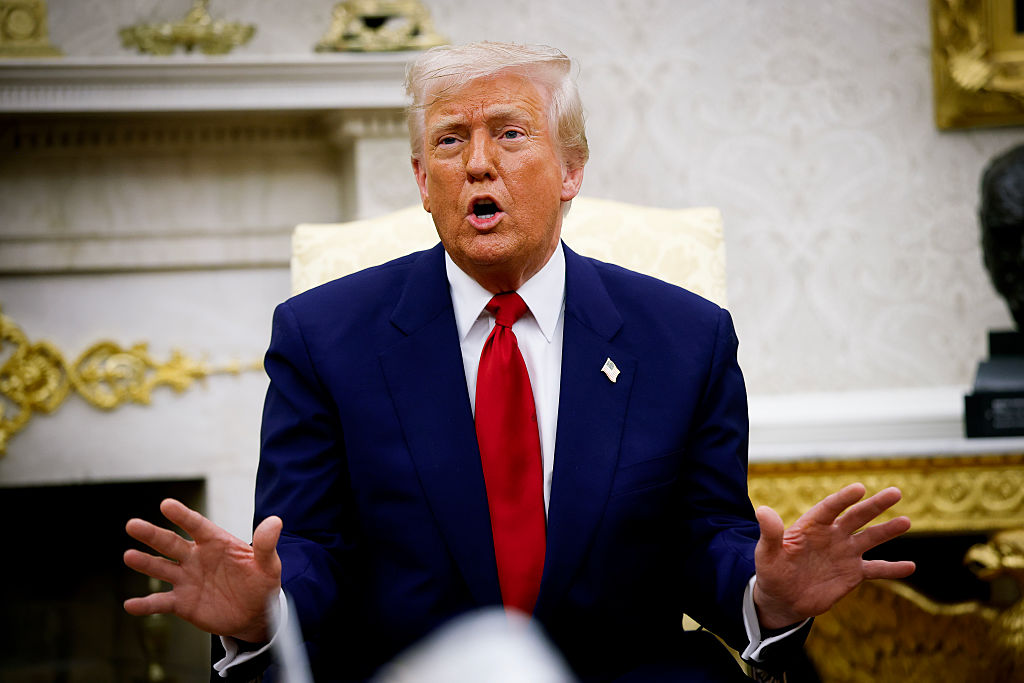
The markets have continued to sour on President Donald Trump’s tariffs on nearly all imports to the United States. Major stock indices have been on successive roller coasters of daily trading, reacting positively to indications the president might relent but then quickly falling after Trump signals he plans to stay his course. Wall Street CEOs have begun publicly voicing criticisms. Even Elon Musk reportedly urged Trump over the weekend to reverse the duties, and he’s begun using Peter Navarro—the senior counselor for trade and manufacturing to the president—as an online punching bag.
But the president has forged ahead with a tariff regime that, if continued, could constitute the largest tax increase in more than 40 years. Trump threatened Monday to bring tariffs on imports from China up to a whopping 104 percent, a threat the White House followed through on as of 12:01 this morning. During a speech at a National Republican Congressional Committee dinner last night, the president also said he would soon levy additional tariffs on pharmaceuticals. Now, court challenges backed by some conservative legal groups are gaining steam.
On Thursday, the New Civil Liberties Alliance (NCLA), a nonprofit legal advocacy group supported by Federalist Society co-chairman Leonard Leo, filed a lawsuit on behalf of a Florida-based stationary company, Simplified, that relies on materials imported from China. The lawsuit alleges the Trump administration’s earlier batch of tariffs in February—which imposed a 10 percent duty on all Chinese imports and 25 percent tariffs on Mexican and Canadian imports—were unconstitutional.
For that first round of tariffs, as well as last week’s “Liberation Day” measures, Trump relied on the International Emergency Economic Powers Act (IEEPA)—a 1977 law empowering the president to scrutinize foreign entities and financial transactions, including by imposing sanctions, when dealing with a national emergency. The president cited the synthetic opioid supply chain from China as the national emergency justifying across-the-board tariffs on Chinese imports. But the NCLA argues that IEEPA does not delegate any tariff power to the executive. “That is a statute that authorizes presidents to order sanctions as a rapid response to international emergencies,” the group noted in its filing. “It does not allow a president to impose tariffs on the American people.”
The lawsuit may have a point: Nowhere in IEEPA is tariff or taxation power mentioned, though presidents have used the law to impose sanctions on countries or freeze financial assets. Former President Joe Biden used IEEPA authority to institute a sweeping sanctions regime on Russia following its invasion of Ukraine. And during his first term, Trump used IEEPA to freeze the assets of a Venezuelan state-owned oil company providing funds to the Maduro regime.
Before February, however, no president had ever used the act to impose tariffs. According to Article I, Section 8 of the Constitution, Congress holds the tariff power, which it has partially delegated to the president in a handful of laws. Trump took advantage of this delegated authority to implement tariffs on things like steel, aluminum, solar panels, and washing machines during his first term. But those laws circumscribe the president’s exercise of tariff power, limiting the scope and criteria of allowable duties imposed by the executive branch.
For example, the Trade Act of 1974 allows the executive to impose tariffs on imports that threaten national security, while the Trade Expansion Act of 1962 allows for tariffs in response to other countries’ violation of trade agreements. “In each of these instances, the Congress has required that various procedures be followed, that investigations into the specific products, practices or countries be conducted, and that certain factual findings be made before tariffs can be imposed,” Jennifer Hillman, a Georgetown law professor who focuses on international trade, explained in a February brief on Trump’s tariffs.
Under these laws, duties can’t be imposed in a day simply at the whim of the president—it took the better part of the year to follow the statutorily designated processes and fact-finding required for the first Trump administration’s tariffs. The Simplified lawsuit argues that Trump’s novel interpretation of IEEPA threatens all of Congress’ tariff authority: “If the president is permitted to use the IEEPA to bypass the statutory scheme for tariffs, the president will have nearly unlimited authority to commandeer Congress’s power over tariffs.”
NCLA also argues that even if IEEPA authorizes some tariffs, Trump’s measures would still exceed the restrictions of the law since it limits presidential actions to those “necessary” to address the emergency. “The means of an across-the-board tariff does not fit the end of stopping an influx of opioids, and is in no sense ‘necessary’ to that stated purpose,” NCLA stated, noting that Trump has said publicly the tariffs’ purposes involve unrelated policy goals like generating revenue for the federal government.
Legal observers see the administration’s interpretation of IEEPA as such a stretch that it could run afoul of the Supreme Court’s major questions doctrine. The doctrine holds that if the executive is seeking to use congressionally delegated power on an issue of major national significance, then that power must be clearly specified in the authorizing statute. And if tariffs on the hundreds of billions of dollars in annual U.S. imports from China are an issue of national significance, Trump’s subsequent tariffs on nearly all imports are exponentially so. “Here, there is no question that this is a major question,” Ilya Somin, a law professor at George Mason University, told TMD. “It’s more of a massive thing than any of the other measures the Supreme Court has struck down because they’re major questions, like Biden’s student loan forgiveness program. That was pretty big, but this is even bigger.”
Somin is working with the Liberty Justice Center, a conservative nonprofit law firm, to recruit plaintiffs to file a challenge to Trump’s ‘Liberation Day’ bevy of tariffs. “We are still in the stage of recruiting plaintiffs and making agreements with them, but it is likely we will be done with that soon,” he said, “and at that point, we will bring our case.” While Somin said he believes the China tariffs at issue in the Simplified suit are also illegal, he argued the broader tariffs that he plans to challenge are even more glaringly unconstitutional. “The ‘Liberation Day’ declaration is not about fentanyl,” Somin said. “Rather, it’s about the idea that bilateral trade deficits are somehow a national emergency.”
“We say there’s no actual emergency because bilateral trade deficits are not some kind of unexpected crisis,” he added. “There’s [also] no ‘extraordinary or unusual threat.’”*
Beyond the legal arguments, Somin also emphasized the practical significance of the president’s use of IEEPA going unchallenged: “If he can tariff any country to any degree he wants for any reason, any time he wants, then effectively, the word of the United States and a trade agreement is no good.”
Today’s Must-Read
When Gavin Newsom was waging his primary bid to be California’s governor, he promised voters on the campaign trail in December 2017: “You’re going to have the opportunity to elect the next head of the resistance.” After steamrolling his Democratic and Republican opponents in 2018, Newsom governed with exactly that vision in mind.
Toeing the Company Line
The Worst Job in Washington
Chris Sununu and 2028.
Kharkiv: Under Fire but Out of the Spotlight
USAID cuts hinder Ukrainian efforts to facilitate media coverage and counter propaganda.
It’s Time for Republicans to Listen to the Markets, Not Trump
The markets don’t lie.
Tariff Terrorism
That Scott Lincicome is so hot right now!
🚨 Trump (Kind Of) Wins On Alien Enemies Act
Plus: Can the president fire federal probationary employees?
Worth Your Time
- Writing for The Atlantic, Jonathan Chait took Democrats to task for their reluctance to attack President Donald Trump’s tariff policies head-on. “At some point, Trump might backtrack on his trade war or pivot to a completely different set of policy obsessions. Perhaps by 2028, Democratic voters will be focused on bringing back Social Security or ending the war in Greenland. But to the extent that the tariffs define Trump’s economic mismanagement, a modulated stance on tariffs is going to become awkward for Democrats,” he wrote. “Not long ago, the political logic of rejecting free trade made a certain degree of sense for Democrats. But events have a way of changing political logic. A trade-skeptical message that worked perfectly well five or 10 years ago is going to sound awfully out of touch after Trump is done turning tariffs into a synonym for catastrophic ineptitude.”
- The Economist examined the emerging face-off between Israel and Turkey in Syria, as the two powers seek to expand their influence in the war-shattered country: “Israel is worried by the scale of Turkey’s involvement in Syria, including its plans to set up military bases and supply the new government’s fledgling army with weapons. Turkey fears that Israel wants to see Syria implode, or break apart. Each accuses the other of preparing to wage war by proxy. … Israel and Turkey also disagree about governance. Israeli officials have openly suggested a federal model for Syria, whereby different minorities, including the Kurds and the Alawites (a Muslim sect from which the Assads hail), would enjoy extensive autonomy. The recent massacres of hundreds of Alawite civilians by armed groups loyal to Syria’s new rulers, they argue, show that [Ahmed al-Sharaa] cannot be trusted. Mr Sharaa and his Turkish allies have had a wholly different system in mind: a strong central government headed by a president with sweeping executive powers.”
Presented Without Comment
New York Times: Chinese Intelligence May Be Trying to Recruit Fired U.S. Officials
The National Counterintelligence and Security Center warned on Tuesday that China’s intelligence services were using deceptive efforts to recruit current and former U.S. government employees.
…
The American government has long said that China uses social networks to secretly recruit people. But former U.S. officials say China now sees an opportunity as the Trump administration shuts down agencies, fires probationary employees and pushes out people who had worked on diversity issues.
Also Presented Without Comment
NewsNation: Stephen A. Smith Considering 2028 Presidential Run
In the Zeitgeist
Florida beat Houston in the NCAA Championship Monday night in an instant classic, ending with the heartbreaking conclusion we’ve come to expect from March Madness. Gators fans went to bed happy. Cougars fans? Well, you can probably guess from that last possession.
Let Us Know
Do you think the groups challenging the Trump administration’s tariffs have a strong case?
Clarification, April 10, 2025: This newsletter has been updated to correct the name of Liberty Justice Center and to clarify that in its prospective lawsuit, Somin views a national emergency and “extraordinary and unusual threat” as separate requirements of IEEPA, both of which the ‘Liberation Day’ measures fail to meet.

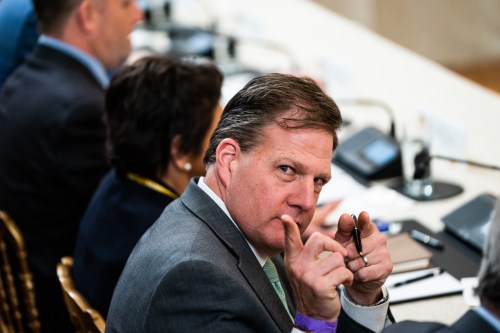
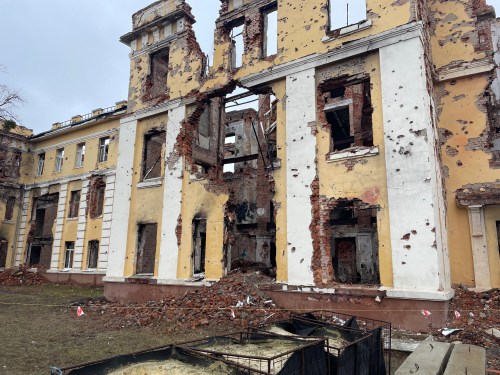
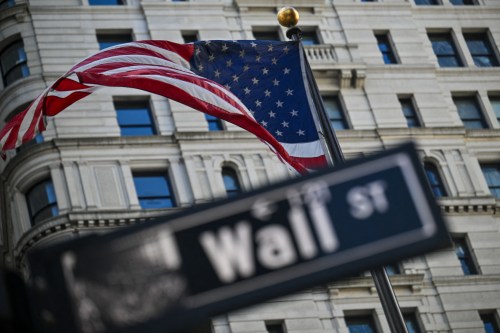
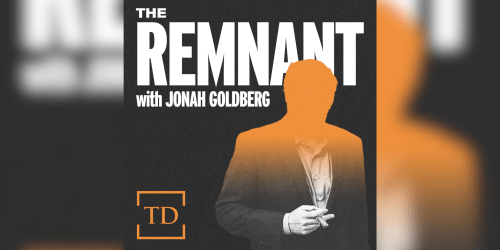
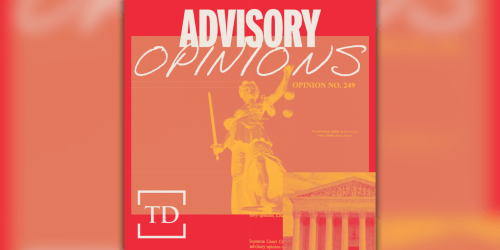



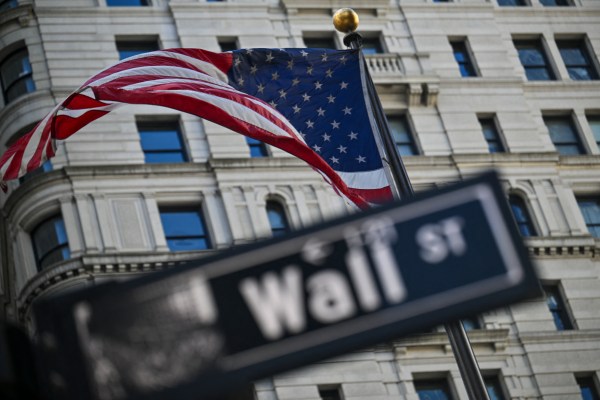

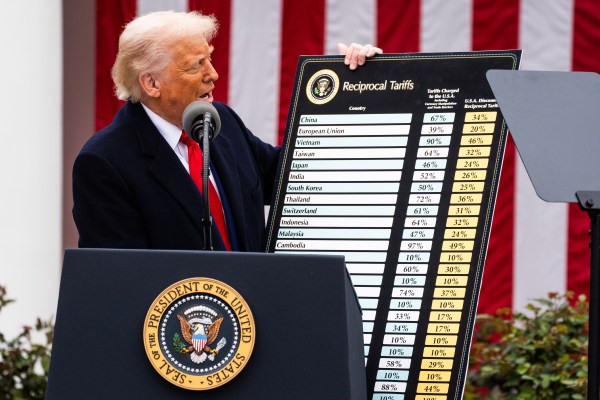

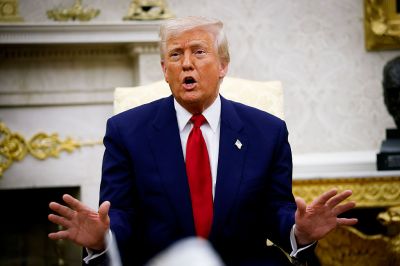
Please note that we at The Dispatch hold ourselves, our work, and our commenters to a higher standard than other places on the internet. We welcome comments that foster genuine debate or discussion—including comments critical of us or our work—but responses that include ad hominem attacks on fellow Dispatch members or are intended to stoke fear and anger may be moderated.
With your membership, you only have the ability to comment on The Morning Dispatch articles. Consider upgrading to join the conversation everywhere.